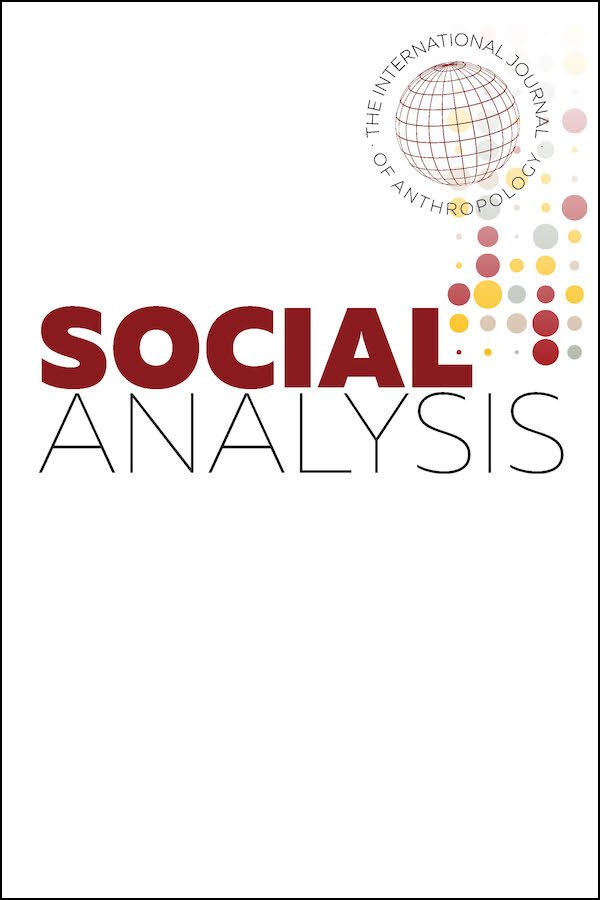
Social Analysis
The International Journal of Anthropology
ISSN: 0155-977X (print) • ISSN: 1558-5727 (online) • 4 issues per year
Latest Issue
Volume 69 Issue 1
Black Boxes
Flat Worlds, Automated Subjects, and the Air France 447 Disaster
When Air France flight 447 was lost in the Atlantic in 2009, stories about the disaster were initially set in the real space of the sky and ocean. Journalists and investigators searched for clues to a reality hidden in the depths of the sea. After the discovery of the aircraft's ‘black box’ flight recorders two years later, the volumes that had governed earlier narratives were replaced by network imagery spreading over a flat plane. This article explores the agency of the flight recorders in producing this narrative shift. It uses that insight to argue that the conceptual spaces of contemporary life may have a patchy quality, and thus that social scientific methodologies based on network imagery may not be universally applicable.
The Welfare Police
The Affective Politics of ‘Proximity’ in the Danish Welfare State
This article investigates the role of Danish police not as enforcers of sovereign order, but as ambassadors of the welfare state—more specifically an image of the welfare state as a benign, caring, and ‘intimate’ kind of polity. Focusing on a recent police reform, the article shows how the emic Scandinavian concept of
A Return to Form
After many years of implicit and explicit anti-formalisms of various kinds, anthropologists are beginning to rediscover the virtues and appeal of form. The figure of form is rising again, at the intersection between a concern with the recurrent and stable aspects of social and cultural life and an interest in conceptual devices that stand slightly off to the side of the immediacy of emergent flows of life and matter. This piece examines the intellectual conditions of this disciplinary ‘return to form’ (the appreciative implication is intended) and explores some of the conceptual and political affordances of formalism and anti-formalism. This is not a fully fledged manifesto for a new formalism, but it scouts out the conditions of possibility for such a manifesto.
Claude Lévi-Strauss
The Founder of Post-Structuralism
This article, originally delivered as a lecture to Mexican colleagues, argues that the time has come to reassess the intellectual legacy of anthropological structuralism as theorized and, above all, practiced by its founder, Claude Lévi-Strauss. One of the central questions to be addressed is whether Lévi-Strauss's oeuvre—to invoke a typical structuralist dichotomy—is internally continuous or discontinuous. While aligning with those interpreters who perceive a unity of inspiration and method throughout his work, we propose that the theoretical persona of Lévi-Strauss is split between two eternally unequal twins: a cultural hero and a trickster—the great mediator (who is also the institutor of ‘diatonic’ order) and his counterpart, the master of separation (who likewise embodies ‘chromatic’ fluidity). We argue that there are two structuralisms—but, as Lévi-Strauss himself demonstrated, two already constitute a multiplicity.
There Is No Such Thing as an African Value of Dependence & What Is the Matter with Values?
A Reply to Joel Robbins & A Response to Lockwood
In “Anthropology Bright and Dark,” Joel Robbins encourages anthropologists to identify “visions of the good” and to explore whether they enable or inhibit “human flourishing.” Ethnographic work on dependence in southern Africa informs his approach and provides a key example of a “model of the good life” in which patron-client relations are seen as ideal social arrangements. But by locating visions of the good in culture, Robbins's approach obscures questions of history, agency, and political economy. The consequence is a misreading of the economic conditions in Africa under which dependent social relationships are sought. Instead of isolating visions of the good, this reply argues that anthropology must reclaim its original holism—its capacity to create synthetic accounts of history, political economy, and moral thought.